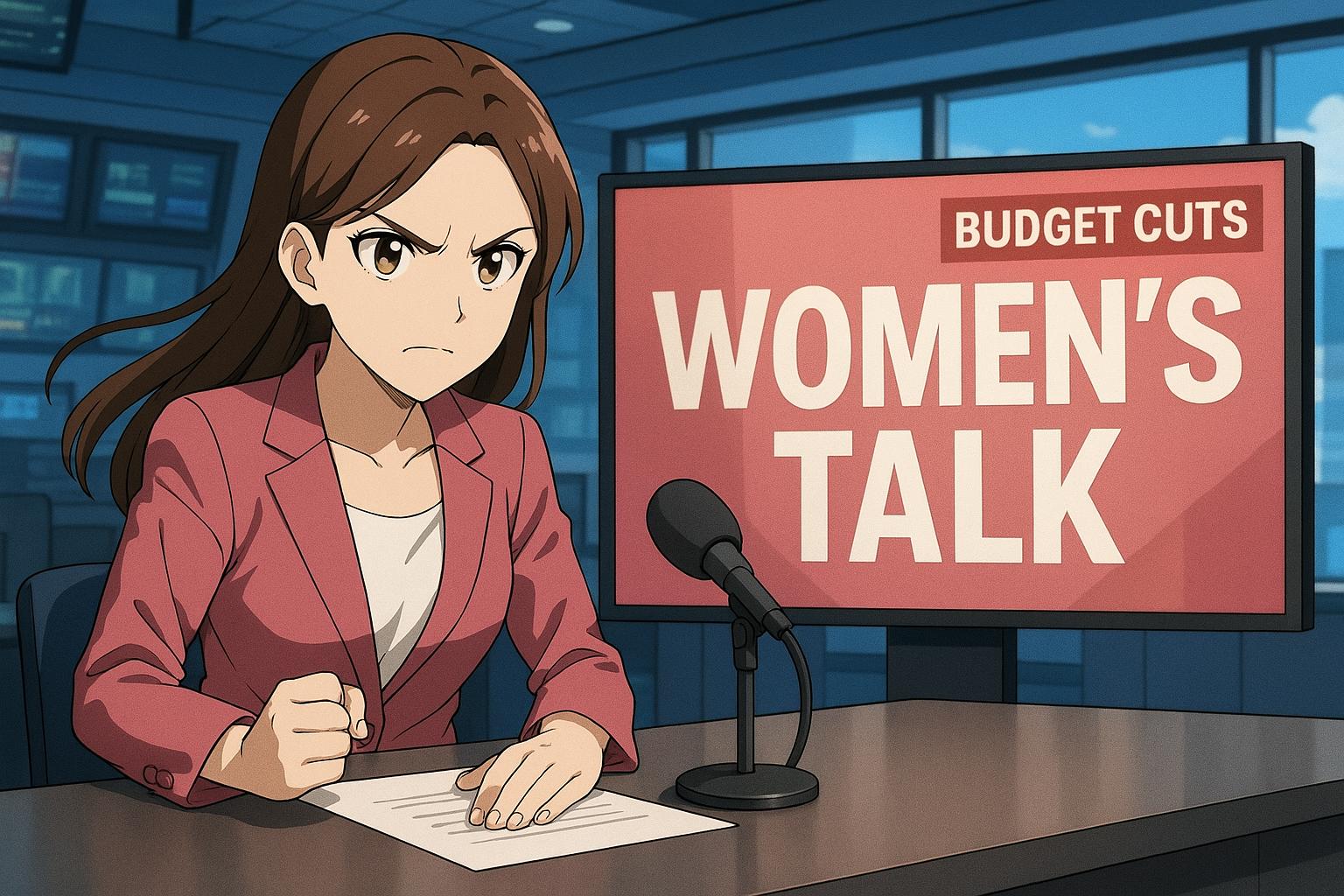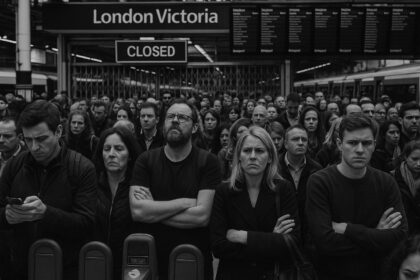ITV’s decision to reduce airtime for Lorraine and Loose Women, two flagship daytime shows known for highlighting women’s issues and health campaigns, raises concerns over the network’s shift in priorities ahead of the football World Cup. The cuts threaten to diminish vital conversations around mental health, domestic violence, and empowerment precisely when many viewers rely on them most.
If I were a producer on a daytime television programme, a genre that often captures the attention of millions of women with its thoughtful dialogues on topics ranging from mental health to health campaigns, my primary concern would be to address the impending cuts announced by ITV. Recent news that the network plans to significantly reduce the airtime of its flagship programmes, Lorraine and Loose Women, serves as a stark reminder of how women’s issues are often relegated to the background when budgetary constraints arise. This restructuring is reportedly intended to fund the coverage of high-profile events, notably the upcoming football World Cup.
From January, both Lorraine and Loose Women will only be broadcast for 30 weeks a year, with scheduled breaks during school holidays—unfortunate timing given that many viewers rely on these shows during such periods. Lorraine’s runtime has already been slashed from an hour to a mere 30 minutes. This leaves an alarmingly short window for the show’s traditional segments, essentially reducing it to a quick introduction before handing over to This Morning. Such drastic changes can feel particularly disheartening in a societal climate that frequently overlooks important discussions surrounding women’s health and well-being.
The term ‘bloodbath’ is, regrettably, fitting to describe the turmoil at ITV. For viewers, these shows are more than mere entertainment; they provide a vital platform for discussing often overlooked issues. The connection between hosts and audiences can be profound. For example, during a segment on Loose Women concerning the challenges of addiction, I was moved by the overwhelming response from viewers grappling with similar struggles, highlighting the importance of representation and dialogue in these spaces.
My first experience on Lorraine was back in 2016, where I recounted my struggles with mental health. The warmth and compassion with which the show handled my testimony were a stark contrast to how such topics are often portrayed across media. Lorraine has consistently provided a platform for critical discussions, from launching campaigns about bowel cancer awareness to promoting breast cancer checks, often driven by real stories shared by viewers themselves. Campaigns such as Change and Check, which emerged after a staff member’s personal battle with cancer, have significantly raised awareness and even led to the inclusion of critical information in public toilets.
When examining the impact of shows like these, one must not overlook Loose Women’s powerful advocacy against domestic violence, which resonated deeply following presenters sharing their own experiences. The potential life-changing influence of such programmes cannot be underestimated, especially in an era where discussions about mental health and personal safety remain urgent and necessary.
Yet, it seems ITV is making a troubling decision to divert funds from these essential conversations towards more commercially viable programmes, such as football. Kevin Lygo, head of ITV, insists that these cuts will facilitate savings for reinvestment across their programming budget. However, the optics of abandoning women’s programming in favour of high-profile sports coverage, particularly given that women also engage with sports, raises significant concerns.
Moreover, the situation at ITV is compounded by a more general decline in viewership across multiple daytime offerings, including Good Morning Britain and This Morning. Internally, staff have been placed on shorter contracts amid fears of redundancies as the network grapples with dwindling ratings. While ITV maintains that shows like This Morning still attract millions—4.2 million viewers during a peak week—the pressure to reshape and possibly redefine their content strategy looms large.
During a testing time for daytime television, it’s disheartening to see the potential closure of vital discussions that only shows like Lorraine and Loose Women can facilitate. These programmes form a crucial part of many women’s lives, offering a unique space for connection, education, and empowerment. As ITV navigates its future direction, one must hope that the network will not neglect the invaluable contributions of programmes dedicated to women’s voices and issues.
In the grand scheme, ITV’s strategy raises concerns not just about ratings, but about the potential cultural shift away from the representation of women’s issues in broadcast media. Such cuts could result in a significant, detrimental impact on the visibility and discussion of critical topics that have historically been neglected. As the media landscape evolves, so too should the commitment to uphold those narratives that truly matter to viewers.
Reference Map
- Paragraphs 1, 2, 3
- Paragraphs 4, 5
- Paragraphs 6, 7
- Paragraphs 8, 9
- Paragraph 10
- Paragraphs 11, 12
- Paragraph 13
Source: Noah Wire Services
- https://www.dailymail.co.uk/femail/article-14740343/BRYONY-GORDON-Im-horrified-ITV-bloodbath-Lorraine-Loose-Women-disgusted-real-reason-it.html?ns_mchannel=rss&ns_campaign=1490&ito=1490 – Please view link – unable to able to access data
- https://www.express.co.uk/showbiz/tv-radio/1901128/ITV-crisis-GMB-This-Morning – ITV’s daytime shows, including ‘Loose Women’, ‘Good Morning Britain’, ‘This Morning’, and ‘Lorraine’, are reportedly facing a crisis due to a significant decline in viewing figures. The broadcaster is considering cost-cutting measures such as pay freezes, redundancies, and shorter contracts to address the issue. An insider mentioned that staff are being placed on three-month contracts to facilitate easier terminations. Despite these challenges, ITV maintains that its daytime programming remains popular, with ‘This Morning’ reaching an average of 4.2 million viewers per week in April 2024.
- https://www.standard.co.uk/showbiz/itv-general-election-coverage-this-morning-loose-lorraine-loose-women-b1164100.html – ITV has announced a shake-up to its morning show programming due to the upcoming general election on July 4, 2024. The schedule change will affect several daytime shows, including ‘Good Morning Britain’, ‘Loose Women’, ‘This Morning’, and ‘Lorraine’. The special election coverage will be led by Tom Bradby, with extended episodes of ‘Good Morning Britain’ and special editions of ‘This Morning’ and ‘Loose Women’.
- https://www.the-independent.com/arts-entertainment/tv/news/itv-general-election-good-morning-britain-lorraine-b2573264.html – ITV has announced a shake-up to its morning show programming due to the upcoming general election on July 4, 2024. The schedule change will affect several daytime shows, including ‘Good Morning Britain’, ‘Loose Women’, ‘This Morning’, and ‘Lorraine’. The special election coverage will be led by Tom Bradby, with extended episodes of ‘Good Morning Britain’ and special editions of ‘This Morning’ and ‘Loose Women’.
- https://www.standard.co.uk/showbiz/itv-deny-cuts-reports-this-morning-loose-women-gb-stars-b1164414.html – ITV has denied reports that some of its biggest stars are concerned for their jobs amid falling ratings. The broadcaster has seen a decline in viewing figures and recently announced that 200 jobs are to be cut in a bid to save £50 million per year. Good Morning Britain is expected to undergo a revamp in a bid to claw back its audience, while discussions are said to be being had at This Morning with viewing figures plummeting by half after Cat Deeley and Ben Shephard took over from Holly Willoughby and Phillip Schofield in May.
- https://www.radiotimes.com/tv/entertainment/coronavirus-loose-women-and-lorraine-live-broadcasts-dropped-from-itv-daytime-schedule/ – Due to the coronavirus pandemic, ITV has suspended live broadcasts of ‘Loose Women’ and ‘Lorraine’. The decision was made to ensure the safety of the cast and crew, and to comply with government guidelines. The shows will continue to air pre-recorded content, but live episodes have been temporarily halted. Viewers are advised to check the ITV schedule for updates on when live broadcasts will resume.
- https://www.walesonline.co.uk/lifestyle/tv/morning-major-itv-daytime-shows-27433135 – There is further disruption to the ITV1 daytime schedule as ‘Lorraine’, ‘This Morning’, and ‘Loose Women’ have been axed from ITV1 on Tuesday, August 1, 2023. This is due to the FIFA Women’s World Cup 2023, which is currently taking place in Australia and New Zealand. On Tuesday, August 1, ITV1 has axed ‘Lorraine’, ‘This Morning’, and ‘Loose Women’ and instead FIFA Women’s World Cup 2023’s Portugal vs USA match will be aired from 7.30am to 10.15am.
Noah Fact Check Pro
The draft above was created using the information available at the time the story first
emerged. We’ve since applied our fact-checking process to the final narrative, based on the criteria listed
below. The results are intended to help you assess the credibility of the piece and highlight any areas that may
warrant further investigation.
Freshness check
Score:
3
Notes:
 The narrative discusses ITV’s decision to reduce the airtime of ‘Lorraine’ and ‘Loose Women’ to fund coverage of the upcoming football World Cup. Similar reports about ITV’s schedule changes for the 2022 World Cup were published in November 2022, indicating that this is recycled content. ([wigantoday.net](https://www.wigantoday.net/sport/itvs-this-morning-lorraine-and-loose-women-taken-off-air-to-make-way-for-2022-world-cup-coverage-3929743?utm_source=openai))
The narrative discusses ITV’s decision to reduce the airtime of ‘Lorraine’ and ‘Loose Women’ to fund coverage of the upcoming football World Cup. Similar reports about ITV’s schedule changes for the 2022 World Cup were published in November 2022, indicating that this is recycled content. ([wigantoday.net](https://www.wigantoday.net/sport/itvs-this-morning-lorraine-and-loose-women-taken-off-air-to-make-way-for-2022-world-cup-coverage-3929743?utm_source=openai))
Quotes check
Score:
2
Notes:
 The article includes direct quotes from the author, Bryony Gordon, which appear to be reused from her previous writings. No new or exclusive quotes are present, suggesting a lack of originality.
The article includes direct quotes from the author, Bryony Gordon, which appear to be reused from her previous writings. No new or exclusive quotes are present, suggesting a lack of originality.
Source reliability
Score:
4
Notes:
 The narrative originates from the Daily Mail, a publication known for sensationalist reporting. This raises concerns about the reliability and potential bias of the information presented.
The narrative originates from the Daily Mail, a publication known for sensationalist reporting. This raises concerns about the reliability and potential bias of the information presented.
Plausability check
Score:
3
Notes:
 The claims about ITV’s schedule changes are plausible, as similar adjustments were made during the 2022 World Cup. However, the lack of new information and the recycled nature of the content diminish the overall credibility.
The claims about ITV’s schedule changes are plausible, as similar adjustments were made during the 2022 World Cup. However, the lack of new information and the recycled nature of the content diminish the overall credibility.
Overall assessment
Verdict (FAIL, OPEN, PASS): FAIL
Confidence (LOW, MEDIUM, HIGH): HIGH
Summary:
 The narrative is recycled from previous reports about ITV’s schedule changes for the 2022 World Cup, lacks new information, and originates from a publication with a history of sensationalism, leading to a low overall credibility score.
The narrative is recycled from previous reports about ITV’s schedule changes for the 2022 World Cup, lacks new information, and originates from a publication with a history of sensationalism, leading to a low overall credibility score.













